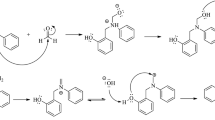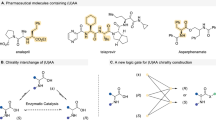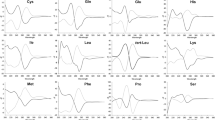Abstract
A METHOD for the reductive methylation of peptides and amino-acids, recently published by Bowman1, was used by him to identify as its N-dimethyl derivative the amino-acid in a peptide bearing the free amino-group. Advantage was taken of the ready solubility of these derivatives in alcohol. This elegant method is, however, not immediately suitable for micro-quantities. As N-dimethylamino acids do not give a colour with ninhydrin, paper chromatography2 of the hydrolysate of a methylated peptide should show the absence of the end amino-acid when compared with the hydrolysate of the original peptide. Should this particular amino-acid also occur elsewhere in the peptide, then a diminution of the intensity of the relevant ninhydrin spot is to be expected.
This is a preview of subscription content, access via your institution
Access options
Subscribe to this journal
Receive 51 print issues and online access
$199.00 per year
only $3.90 per issue
Buy this article
- Purchase on SpringerLink
- Instant access to full article PDF
Prices may be subject to local taxes which are calculated during checkout
Similar content being viewed by others
References
Bowman, R. E., J. Chem. Soc., 1349 (1950).
Dent, C. E., Biochem. J., 43, 180 (1948).
Woiwod, A. J., J. Gen. Microbiol., 3, 312 (1949).
Author information
Authors and Affiliations
Rights and permissions
About this article
Cite this article
INGRAM, V. A Micro End-Group Method for Peptides. Nature 166, 1038 (1950). https://doi.org/10.1038/1661038a0
Issue date:
DOI: https://doi.org/10.1038/1661038a0



